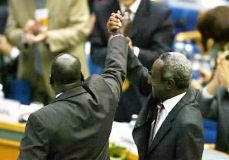Sudan govt and rebels agree to end southern conflict by year’s end
NAIROBI, Nov 19, 2004 (AP) — Sudanese government and rebel officials signed an agreement Friday promising to end the 21-year civil war in Sudan by the end of the year in front of the U.N. Security Council holding a special meeting in Africa.

|
|
Sudanese First Vice President Ali Osman Mohamed Taha (R) and Sudan People’s Liberation Movement leader John Garang (L) shake hands during U.N. Security Council meeting in Nairobi, Kenya, Nov. 19, 2004 after Sudan’s government and its southern rebel foes promised to end Africa’s longest running civil war by the end of the year. (Reuters). |
The security council also passed a new resolution on Sudan Friday, offering to support peace processes in the country aimed at ending two civil wars that have left millions dead and many more homeless.
Sudanese Vice President Ali Osman Taha and southern rebel leader John Garang, the main peace negotiators for the two sides, pledged to end the southern conflict by the end of last year, but missed the 2003 deadline and two more deadlines after that.
However, this is the first time the warring sides have put a deadline in writing before the Security Council.
The U.K.’s U.N. Ambassador Emyr Jones Parry said the Security Council expects all sides of the conflicts in Sudan to comply with the call for an end to violence and that the council “needs to be ready to take tougher action.”
Garang, in a rare address by a rebel leader to the council, said the only way to avert tragedy is “to install a broad-based coalition government of national unity.”
He told members that only four issues remain to be resolved before a comprehensive agreement ending the southern war can be signed.
Taha told the Security Council that his country is committed to peace and that he agreed a new government would be able to resolve the country’s problems swiftly.
Southern rebels have been fighting the government since 1983, and the western region of Darfur erupted into violence in February 2003.
The southern war has pitted Sudan ‘s Islamic government against rebels seeking greater autonomy and a greater share of the country’s wealth for the largely Christian and animist south. The conflict has left more than 2 million people dead, largely through war-induced hunger and disease.
